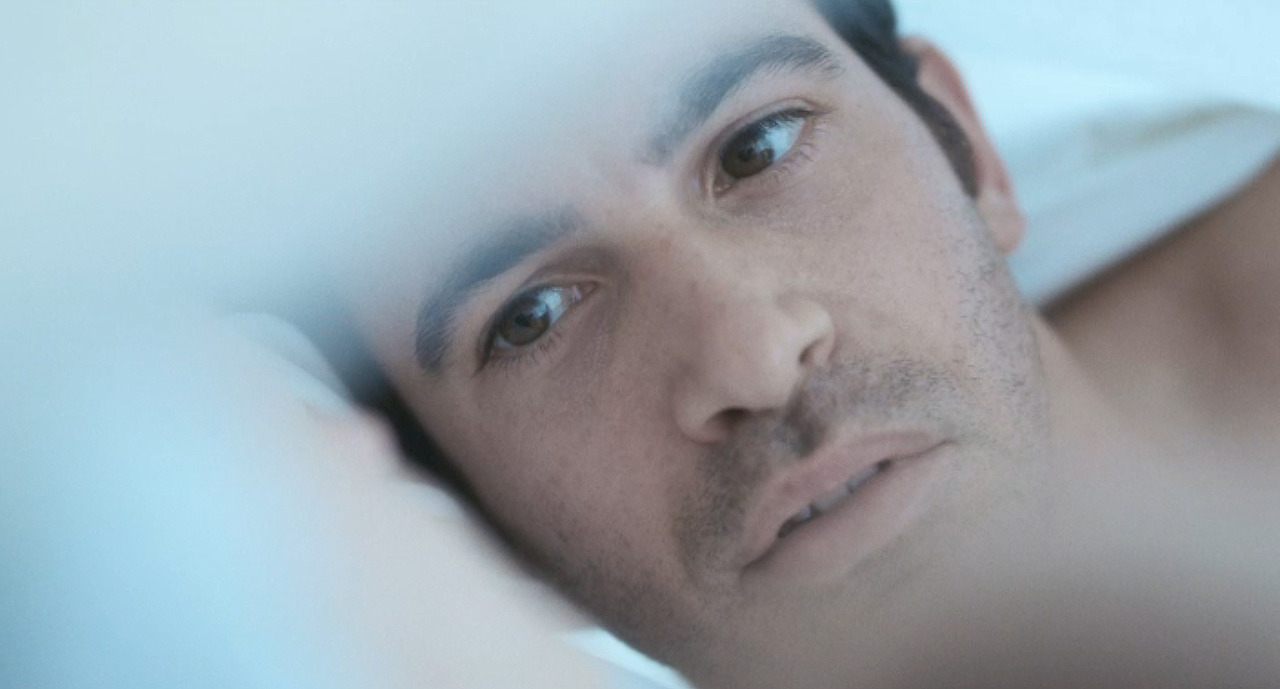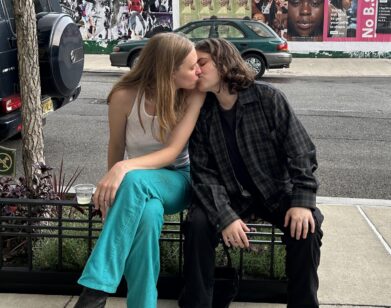Chris Messina Doesn’t Play Favorites

ABOVE: CHRIS MESSINA IN 28 HOTEL ROOMS.
It’s a strange thing to hear from someone cast in what seems like most everything right now—blockbusters (Ben Affleck’s Argo), acclaimed indie flicks (Matt Ross’s 28 Hotel Rooms), rom-com sitcoms (Mindy Kaling’s The Mindy Project), walk-and-talk cultural critiques (The Newsroom) and hard-hitting legal thrillers (Damages)—but Chris Messina confesses that he wishes he was acting in the 1970s. His rationale works: he falls hard for the brooding and subtle character-driven masterpieces of that era. While he would like to direct movies like Serpico in the future, he’s happy playing a range of characters for now—though he admits, “It’s a bit schizophrenic.” When we got a chance to chat, Messina was in his trailer at The Mindy Project, working through the latest script from The Newsroom. If he’s so sought-after now, how could the ’70s have treated him better?
MAGGIE LANGE: The Mindy Project sets you up for a will-they-won’t-they-but-they-will relationship with Kaling, but the fascinating thing about it is that your characters have an almost adorably immature sibling rivalry. Tell me about how you guys create that relationship.
CHRIS MESSINA: We definitely talked a lot about Moonstruck when we first started filming, and how those two characters would kind of have this love-hate thing. And obviously Sam and Diane [Cheers] is this great example of this bicker and flirt at the same time. It morphs. We’re on our first season, so it’s always changing and growing. I’m not sure what’s going to happen with these two, they go back and forth slapping each other to really helping each other. At times, it could go down a romantic road, and then sometimes it’s like he’s her older brother, too. I’m not sure how it will go. There is definitely a respect for one another, and they definitely do things that just annoy the hell out of each other.
LANGE: You’ve got a very different type of complicated relationship in 28 Hotel Rooms. One of the most fascinating things is how your character responds vehemently against the physical spaces of the film. What was it like to work in an enclosed environment?
MESSINA: It’s nice. I found out that I like shooting like that. It was such a small crew, and being locked in a hotel all day long for several days kind of helped the feeling of what the characters were going through, the claustrophobia, locked inside. I enjoyed it. It definitely informed what we were going through, because we were constantly juggling hotel rooms.
LANGE: Tell me about the character of Reese Lansing in The Newsroom. He’s emblematic of a significant character in media, especially in light of the News Corp scandal. What did you do to capture this?
MESSINA: The writing is so good with that show; it’s really all on the page. Aaron gives us everything you need. I think Aaron Sorkin is like Shakespeare. When you go through it, there is a rhythm and clues all over the place of how it should be played. But of course, when we were making that, all the wire-tapping [incidents] and the Murdochs were on the front page every day. We didn’t talk about it, we didn’t say that this is what it should be or who it’s based on, but obviously, reading all those articles and hearing about those sons and that family…
LANGE: What did you turn to in order to shape that character?
MESSINA: I thought about being the son of a very powerful person—in this case, Leona Lansing. What would that be like? How he has to live up to that pressure of trying to prove himself to the rest of the company. There is something that is always seeping through that character. He’s always trying to prove himself, show that he deserves to be there, he wasn’t just handed it. We go back to The Newsroom next week, and I’m excited to go back.
LANGE: You’ve appeared in a big range of things recently, especially television with longer character arcs—Damages, The Mindy Project, The Newsroom. Which character are you most attached to?
MESSINA: Yeah, it’s like picking your favorite kid out. They’ve all been really fun to play. They all require a different muscle and different preparation. The Mindy Project is really best when you’re loose, and we improvise a lot, and that’s what’s best. Doing something like Damages, I played a character with post-traumatic stress. I was playing with sleep deprivation. I was not sleeping, I stayed up for three days at a time, drinking Red Bull. I would get shaky and tired and hyper. Those two alone are different ends of the spectrum. They are both really fun to play, I’m so lucky to play both characters. I’m still learning so much about Danny. We are only on our 12th episode. I was thinking this morning, I don’t know who he is and I do know who he is. I’m trying to figure it out. I can answer better in a couple years.
LANGE: That long?
MESSINA: That’s the cool thing about television. Damages, The Newsroom, The Mindy Project, it’s good to go back. When you do a play, you do it for a couple months, and it just gets in your bones. You can learn about somebody that way. What I love about TV, you read a script, and I never thought he would do this or do that, and be this way, but it shows a total other side to him, and that’s an exciting thing. When you do a movie, you shoot, and then you go away. A lot of the times you walk about from the movie, you say: “Oh, I get that scene now… Oh, that whole ending—I wish I could have done another shot.” What’s fun about a TV show, you keep coming back and taking swings and seeing if you can get on first base.
LANGE: You’re an extremely busy guy at the moment, but tell me about what you want to work on next.
MESSINA: I have a couple projects that I want to direct, so a couple scripts that are being written and reworked. I should know more early next year. Right now it’s just physically and mentally getting through both The Newsroom and The Mindy Project, and doing the best work I can there. That’s really where it is at, but I love to direct and have a lot of ideas and stories I want to tell. I just have to find the right way.
LANGE: What type of film will this be? Drama, action, comedy?
MESSINA: It’s more drama. It’s funny that I ended up doing a network comedy. I like funny things, but I don’t find myself particularly funny. What I find funny is the truth, so I like when we get close to that. The characters are funny, situations are funny. When I’m doing a drama, I like to find the comedy; when I’m doing a comedy, I like to find the heart and drama. So the movies that I’m thinking about, one is a dramedy—a lot of depth and heart to it, a lot of funny things, but some real, straight-up drama.
LANGE: What films are you looking to for influences for your own movies?
MESSINA: I am a big fan of movies from the ’70s. I love character stuff, like Serpico, or like a Woody Allen—I would never be able to do anything like those, those are incredible movies, with great characters and so much truth and heart really funny. You find yourself laughing and also crying. Sometimes, I feel like I was born at the wrong time. Those movies really speak to me. Something like Deer Hunter, The Graduate, Midnight Cowboy. I’m always looking for stuff that reminds me of those small, character-driven stories.
CHRIS MESSINA STARS IN 28 HOTEL ROOMS, OUT NOW IN NEW YORK. HE ALSO APPEARS IN THE MINDY PROJECT, TUESDAYS ON FOX.






